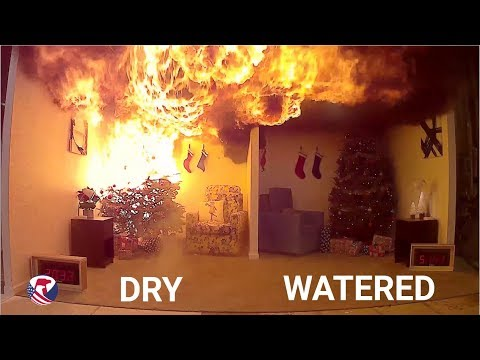Welcome!
Hello and welcome to the Central Carolina Home Inspections, LLC blog. I’ll make periodic blog posts about important topics which matter to any homeowner or renter, which can help you save money, prevent costly repairs, or just make good common sense.
Keeping a Safe Christmas Tree
This holiday season I wanted to remind everybody of the fire danger associated with Christmas trees. Please make sure you water your tree frequently, at least daily. A dry tree can easily catch fire and will rapidly fill your house with smoke, heat and flames. Although Christmas tree fires aren’t very common, they are dangerous incidents which threaten life and home. Below I have a video which compares the burn rate of a dry Christmas tree with that of one which was well-watered. This video was created by the US Consumer Product Safety Commission (CPSC), which is a valuable resource for learning about home hazards, typically through recalls. You can find out more from the CPSC here: https://www.cpsc.gov/.
To ensure your Christmas tree is as safe as possible you can easily do the following:
- When purchasing your tree, check it for freshness by pulling a branch through your closed hand. If few needles come off into your hand then the tree is fresh. If your hand (and the ground at your feet) is covered in needles then it is a tree which has been out of water for quite some time.
- When you setup your tree try to keep it at least a couple feet away from heat sources, which reduce the time it takes for your tree to dry out. This includes air vents, radiators, fireplaces, and wood stoves. If your ideal location is over an air vent or radiator, disable the heat source. You can do this by turning off the radiator, or using a towel to block the air vent (ball it up and gentle shove it in the hole). You should use a towel because simply closing the shutters on the air vent will still allow a large amount of air through.
- Don’t use candles to illuminate your tree. Although they are very pretty, an open flame against a tree is very dangerous.
- Use strand lights which have been tested by a nationally recognized testing laboratory, like UL. There will be markings on the package and on the strand itself when new (usually a white or silvery tag near the plug).
- Check your lights each year from broken light bulbs, frayed wiring, loose plugs, etc. Throw away and replace any strands which fail your inspection.
- Always turn off the lights when leaving the house or going to bed. As you see in the video, it doesn’t take long for a dry tree to catch an entire room on fire.
- As always, ensure you have functioning smoke detectors. Standard practice is a smoke alarm on every floor of a house, plus one in every bedroom. Test your smoke alarms monthly and be sure to change your batteries every year (at a minimum). Working smoke detectors save lives.
- After Christmas, dispose of your tree in a safe location. Don’t leave it in your garage or against your house. Your local municipality may provide a tree collection service.
Please be safe this Holiday Season, and don’t forget to call CCHI for your home inspection needs!

